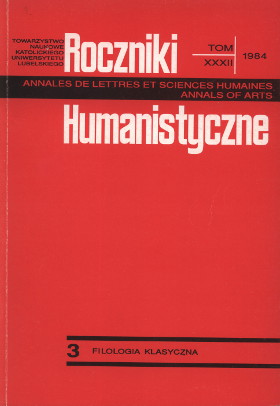Księga Heraklita z Efezu i jej losy
Abstract
Some scholars doubt whether Heraclitus wrote any philosophical work. Since this opinion cannot be refuted by means of testimonies, "the book of the philosopher" should be considered as "the book ascribed to him by the ancients". Nevertheless, basing ourselves on their opinion, we must thoroughly check it to prove our conclusion. Moreover, the texte of the ancients are always appreciated without the testimonies of their genuine parts in order to show a real difference between the impression the book "as a whole" made on the ancients and the impression made by its fragmentary parts.
Heraclitus wrote a single work in one "book" (i. e. on a single standard papyrus). There is no original title. Περὶ φύσεος became a typical title in the middle of the 5th century BC. Μοῦσαι means probably quaestiones ("researches, inquiries") and has nothing to do with the Muses or else the "poetic" style of the work. A poem by Diodotos constitutes the motto. The last title is probably a deformation of the very beginning of the book (none of the suggested lessons is really convincing while γνώμη with an object in genitive speaks for an early date).
Division into three λόγοι was not made by Heraclitus but it partially reflected the real structure of the book. The division was probably made by a philosophical school (not the Stoics in any case: in the Stoic terminology to pan meant "restricted world", τὸ ὅλον "unlimited vacuum". It is improbable that there were two separate parts: dealing with the world and God since περὶ τοῦ παντός means "about all things" contrarily to the two remaining parts: on politics and theology (= physics). The first part was devoted to more misscallenous subjects. Diodotos and Sextus’ views do not prove in any way that the book as a whole dealt with politics; they do not speak for the ethic theory of Heraclitus, either.
Hipolyt understands τὸ κεφάλαιον "the main point" (but not a "chapter"). It refers to the theory of the identity of opposites, the theory defining God.
Heraclitus’ "darkness" was interpreted by the ancients as either conscious (esoterism) or unconscious (stylistic shiftlessness, innate impulsiveness). It followed from the deepness of his thought (symbols and allegories) and frequently appeared above his readers’ understandling. There were two reasons for the difficulties in understanding: 1) lack of "joining words", 2) syntactic homonimy.
The book was laid as a votive offering to be protected from distruction and to serve those who would need its copy. It is quite possible it was discovered in a "secret way" after Heraclitus’ death. The story of Euripides and Socrates was probably true. The dramatist could bring the book frome his travel and give it to Aristotle. It was still attainable at the beginning of the 3rd century AC. Most of the commentators lived in the 4th and 3rd century BC. In the second half of the 3rd c. AC all direct quotations disappeared from the ancient texts. The same happened with the book. It was probably connected with the shift to the parchment codex as well as with the growing role of Christianity in the literary tradition.
Copyright (c) 1984 Roczniki Humanistyczne

This work is licensed under a Creative Commons Attribution-NonCommercial-NoDerivatives 4.0 International License.





